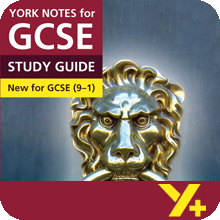Examiner's Notes
You assessed this answer as Grades 6–7.
Hover over the highlighted text to read the examiner’s comments.
Question: Read from ‘For again Scrooge saw himself …’ to ‘...‘‘I was a boy,” he said impatiently’ (Stave Two, pp. 34–5). In this extract, Scrooge and Belle discuss how Scrooge's desire for money has changed him.
Starting with this extract, explore how Dickens presents Scrooge's attitude to money.
Write about:
- how Dickens presents Scrooge's attitude to money in this extract
- how Dickens presents Scrooge's attitude to money in the novel as a whole.
Dickens typically shows us Scrooge’s character through his appearance, listing greed and ‘passion’ and develops this using the image of a tree which will grow to throw a ‘shadow’. This conjures up thoughts of the Garden of Eden, perhaps suggesting this is the moment Scrooge steps into the wilderness and away from God, an idea that is further represented in the novel by the initial obscuring and final joyful ringing of the church bell tower.
It is interesting that Belle uses the term ‘idol’ to describe Scrooge’s relationship with money. Its biblical connotation of money being seen as a god would not have been lost on Victorian readers and adds a sinister layer of meaning to the noun and sums up Scrooge’s absolute obsession with money, suggesting it is, at the very least, unhealthy for the soul.
Scrooge’s justification of his ‘pursuit of wealth’ is ironic – he claims ‘there is nothing on which [the world] is so hard as poverty’. Dickens’s irony here is very gentle as it is only when we remember his initial description of Scrooge as liking ‘to edge along the crowded paths of life’ do we see his double standards in wanting social acceptance whilst rejecting ‘human sympathy’.
Dickens’s presentation of Belle as articulate and thoughtful further emphasises Scrooge’s poor choice, showing his attitude towards money has negative consequences. Scrooge dismisses his younger self: ‘“I was a boy,” he said impatiently.’ The adverb ‘impatiently’ contrasts with Belle’s dignity and links with his ‘restless motion in the eye’ suggesting Scrooge’s pursuit of money is a love that will never be satisfied. Indeed, the reader is led to understand that if Scrooge continues without changing only death will put a stop to its pursuit.
Furthermore, Scrooge describes his attitude to money as an example of him having ‘grown so much wiser.’ Here Dickens really wants his readers to consider the value of money and the wisdom of allowing it to dominate. Earlier in the office Scrooge had mocked Fred for being merry at Christmas despite being ‘poor enough’. However, Fred articulates Dickens’s message that the emotional and social aspect of Christmas has value in itself: ‘it has never put a scrap of gold or silver in my pocket, I believe [Christmas] has done me good.’ We are invited to select whose ‘wisdom’ we follow regarding money although clearly Dickens presents Fred’s approach as his recommended path!
It is perhaps when Scrooge meets with the charity collectors that the real danger of making money your ‘idol’ can be seen for Scrooge has totally rejected any sense of human compassion. Dickens uses the dialogue to gradually reveal Scrooge’s shockingly harsh response to the poor. When he finally shows us Scrooge’s Malthusian principles, that the poor should die and ‘decrease the surplus population’, he has made Scrooge so despicable we automatically reject this argument in favour of Dickens’s far more compassionate ‘ghost of an idea’. This inclusion of politics in an entertaining Christmas story suggests Dickens intends his readers to consider their attitudes to money as well.
Scrooge’s obsession with money and wealth is securely established throughout the novel so his transformation is absolute. Dickens carefully ensures Scrooge rectifies his earlier errors and changes his attitude to money: now he gains joy from giving it away and supporting others with it. He gives half-a-crown to the boy who fetches the Poulterer, thus correcting his actions to the carol singer; he gives ‘a great many back payments’ to the charity collector and joins Fred and his family for Christmas Day. Dickens finishes by ensuring we know this changed attitude towards money is lifelong and that it makes Scrooge richer emotionally and socially; implying, of course, that we will also be ‘richer’ if we adopt such a stance ourselves.
